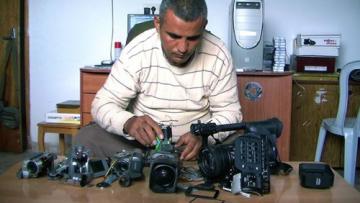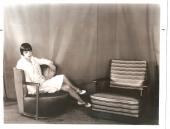`Five Broken Cameras' documents Palestinian resistance
Americans currently divided over the (dubious) theory and (problematic) practice of "Stand your ground" in Florida should sympathize with a painfully similar concept---and rallying cry---in the West Bank, and elsewhere. Be it Trayvon vs. Zimmerman or Palestinian villagers vs. Israeli settlers, the question is always the same: Who's standing whose ground against whom?
There's no doubt where director Emad Burnat's sympathies lie in "Five Broken Cameras," a joint Dutch-French-Palestinian-Israeli documentary being screened as part of the Carnegie Mellon International Film Festival.
A Palestinian falah or peasant farmer, Mr. Burnat never intended to be a "real" filmmaker. But his five cameras would turn him into one. Arrayed side by side on a table, like dead pigeons, at the outset, their battered exteriors reveal as much as their interior videotape about an ongoing story of resistance to Israeli occupation.
Mr. Burnat got his first camera when his fourth son, Gibreel, was born, with the prosaic intent to make some home movies. He, like most folks in his village of Bil'in, eked out a living as olive pickers and gatherers, but that modest livelihood was disrupted by Israel's construction of a barbed wire and concrete barrier to separate the villagers from the new Israeli settlers.
Olive trees are pulled out or burned in preparation for the ever-encroaching settlements. Protests against the dividing wall intensify. As Gibreel graduates from baby to toddler, his first words are "cartridge" and "army," while his father's home movies gradually come to document the turmoil surrounding the barrier: Night raids terrify the children. Mr. Burnat's four brothers are all jailed at various points, as are his friends leading the resistance: furious and fearless Adeeb; cheerful Daba, shot for throwing rocks at soldiers; "Phil," the town's charismatic clown -- killed before our very eyes.
At great risk, Mr. Burnat keeps filming those increasingly violent clashes with the Israeli Defense Force, who blanket demonstrators with a rain of teargas canisters and haul off real and imagined saboteurs of Israeli development alike. Teargas and tears, indeed, divided into "acts" or chapters corresponding to the five cameras -- all destroyed in action, and some of which took bullets meant for Burnat himself.
This microcosmic human glimpse into a long macrocosmic political conflict reminds how difficult it is---for Israelis and Floridians as well as Palestinians---to retain nonviolent ideals, find the inner strength to keep going and raise your kids while defending your turf. Pro-Palestinian sympathizers from Israel and around the world show up to support the people of Bil'in ("Ich bin ein Bi'liner!"), but the high-rise settlements keep going up, and the wall doesn't come down, despite Israeli court orders to dismantle it. It's an activist polemic and fine example of the power of visual documentation of civil disobedience and collective resistance.
But it's also confusing and unclear at times, as well as shamelessly manipulative -- with little soulful, doe-eyed Gibreel prodded to say things like, "Why did they shoot my Phil?" And the fact that many of the villagers' protest signs and chants are in English suggests they're designed for the camera's and international media's benefit.
The knee-jerk "anti-Israeli" charge, however, should be parried by Israeli filmmaker Guy Davidi's role as co-director, and by the Israeli Film Council's support for the documentary. Plus the ironic/paradoxical fact that, following his injuries during filming, Mr. Burnat was taken to a Tel Aviv hospital for excellent treatment and recovery.
We are left with a kind of hope -- and a memory of warm, charming moments amid the disturbing ones: Mr. Burnat's calm, cool wife, Soraya (with her Brazilian soccer-fan origins!), and their four well-groomed, well-behaved, well-educated boys. We come to know and admire them, and their perseverance in the face of intolerable distress.
If only they, and we, could get beyond the stupidity and futility of a "good guys, bad guys" view of the world, and the endless cycle of old wounds that can't heal because of new wounds piled on top of them. Walls, of course, don’t secure people or borders---they undermine them.
Mr. Burnat wonders how these children will be able to bear their lost childhood and their anger. "Healing is the challenge and the victim's obligation," he says. "So I film to heal."






